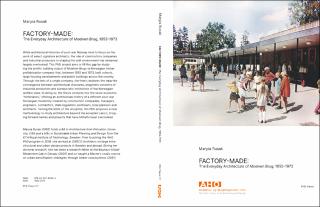Factory-made : the everyday architecture of Moelven brug, 1955-1973
Doctoral thesis
Published version
Permanent lenke
https://hdl.handle.net/11250/3010759Utgivelsesdato
2022Metadata
Vis full innførselSamlinger
Sammendrag
While architectural histories of post-war Norway tend to focus on the work of select signature architects, the role of construction companies and industrial producers in shaping the built environment has remained largely overlooked. This PhD project aims to fill this gap by studying the prolific building output of Moelven Brug—a Norwegian timber prefabrication company that, between 1955 and 1973, built schools, large housing developments and public buildings across the country. In order to meet the growing demand posed by the rapidly urbanising Norwegian state, and to do so cheaply, the company developed a highly-mechanised production apparatus. Over time, Moelven’s prefabricated products were incorporated by architects into a wide range of projects. Through the lens of a single company, the thesis explores the tripartite convergence between architectural discourse, pragmatic concerns of industrial production and bureaucratic institutions of the Norwegian welfare state. Approaching the company in its entirety, it examines aspects ranging from managerial organisation and labour relations to technological import and details of construction. In doing so, the thesis ventures into the socioeconomic “hinterlands,” offering an architectural history of a different post-war Norwegian modernity created by construction companies, managers, engineers, contractors, state regulators, politicians, local planners and architects. Testing the limits of the discipline, this PhD proposes a new methodology to study architecture beyond the accepted canon, bringing forward names and projects that have hitherto been overlooked.
